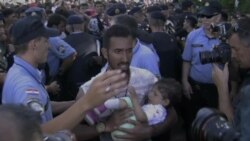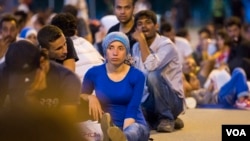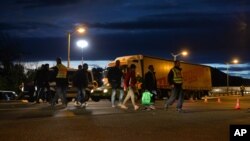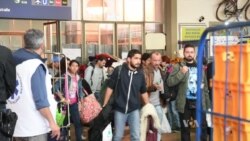Croatia sent at least 1,000 migrants to Hungary by train and bus Friday after saying it can no longer register or accommodate the new arrivals.
The migrants were in turn boarded by Hungary onto other trains and buses that police say were headed to registration points near the border with Austria.
Many of the migrants sat for hours on board trains in sweltering temperatures Friday as they tried to navigate the often confusing and contradictory border decisions of European nations facing the huge influx of migrants, many of whom are from war-torn nations such as Syria, Afghanistan and Iraq.
Earlier Friday, Croatian Prime Minister Zoran Milanovic said that his country cannot and will not close its borders, but will redirect migrants to Hungary, after more than 17,000 migrants crossed into Croatia in just three days.
Milanovic said his nation of 4.2 million no longer would register migrants after more than 11,000 entered the southeastern European country this week. It sealed seven of its eight border crossings with Serbia late Thursday after migrants surged into the country and Hungary turned them away.
"What else can we do?" Milanovic said at the news conference, according to the Associated Press. Speaking of the migrants, he said: "You are welcome in Croatia and you can pass through Croatia. But go on. Not because we don't like you, but because this is not your final destination."
Milanovic promised he will not send government troops to the border, calling the move "both unconstitutional and impossible."
Collective action urged
A spokesman for the United Nations High commission for Refugees, UNHCR, said Friday that the European Union needs to take collective action in the face of the migrant and refugee crisis.
Speaking in the Croatian town of Tovarnik, where thousands of migrants are waiting to board trains, Babar Baloch said that although the UNHCR can help, the moral and legal responsibility to deal with the current migrant situation rests with countries in Europe.
"We have responded to humanitarian emergencies within hours," he said. "Within three days, we can put in place mechanisms for refugee arrivals, registration [of] up to 5.5 million people or 750,000 people. We can empty our warehouses in Dubai, Copenhagen and other places.
"We know how to do the job, but the responsibility – the moral and legal responsibility here – is on the countries in the European Union," Baloch added. "What's missing is a collective European Union action. Countries have been trying to deal with it on their own, and then at some stage they say they can't. So they need to do it together."
Germany
Also Friday, Germany's foreign minister said if some European Union members continue to resist a quota system for accepting refugees, they may have to be overruled by the other members.
Frank-Walter Steinmeier told a German newspaper that Europe should consider the use of a "qualified majority" vote at next Wednesday's meeting of EU foreign ministers to discuss the refugee situation. The 28-member EU normally tries to reach a consensus on important issues.
Steinmeier said Germany, Austria, Sweden and Italy cannot carry the burden of hosting Europe's current flood of refugees alone.
Will not comply
Four eastern European countries – Hungary, the Czech Republic, Slovakia and Poland – have said they will not comply with the quota plan Steinmeier is trying to push through. A meeting of EU interior ministers last Monday failed to reach consensus on the plan, although the European Parliament approved the measure later in the week.
Germany has taken the lead in offering to accommodate the refugees, many of whom are from war-torn nations such as Syria, Afghanistan and Iraq. But even Europe's most prosperous nation has found itself overwhelmed by the sheer numbers of migrants flocking to its borders.
Refugees shut out of Hungary have turned to Croatia in looking for a path west to Germany, Austria and Sweden.
Austria
Austria is lending its voice to Germany's call for European cooperation. Meeting Thursday in the Slovenian capital, Ljubljana, Austrian Chancellor Werner Faymann and his host, Prime Minister Miro Cerar, called for an urgent EU response to the migrant crisis.
After the meeting, Faymann said it was time to prove that Europeans "do not want a Europe in which everyone will try to shift their problems to others' shoulders."
At least 9,200 migrants have entered Croatia since Hungary closed its border, officials said.
Hungary defended its border closing by saying it was protecting its territory against the influx of migrants looking for better economic opportunities, not fleeing persecution in their homelands.
More than 430,000 migrants seeking a better life, including refugees from Syria and Iraq, have crossed into Europe this year. Migration watchers say nearly 3,000 have died trying.
WATCH: Luis Ramirez reports from Munich, Germany
















